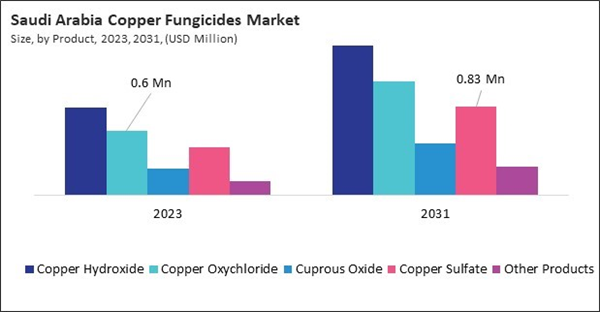Copper sulfate is one of the most commonly used fungicides, valued for its versatility and efficacy in controlling fungal and bacterial diseases. It is a key component of Bordeaux mixture, which has been used for over a century to manage diseases like downy mildew, leaf spot, and rust in fruits, vegetables, and vines. Its affordability and broad-spectrum activity make it especially popular among small and medium-scale farmers. However, concerns about copper accumulation in soil have led to the development of low-dosage and slow-release formulations. These innovations aim to balance effectiveness with environmental safety. Consequently, In Brazil, 1,144.4 tonnes of copper sulfate are expected to be utilized by the year 2031.
The Brazil market dominated the LAMEA Copper Fungicides Market by country in 2023, and is expected to continue to be a dominant market till 2031; thereby, achieving a market value of $11.78 millions by 2031. The Argentina market is registering a CAGR of 7.6% during 2024-2031. Additionally, the UAE market would witness a CAGR of 4.4% during 2024-2031.
Copper fungicides have extended their applications beyond agriculture, proving highly effective in non-agricultural landscaping, horticulture, and aquaculture. These fungicides are crucial in maintaining the health and aesthetic appeal of ornamental plants and green spaces in landscaping and horticulture. They are commonly used to combat diseases like black spot, powdery mildew, and rust in high-value plants such as roses and azaleas, ensuring vibrant and disease-free blooms. On golf courses and sports fields, copper fungicides protect turfgrass from fungal infections like dollar spot and brown patch, preserving these recreational spaces' visual appeal and functionality.
In aquaculture, copper fungicides are vital for controlling fungal infections in fish and amphibians, such as Saprolegnia, and maintaining water quality by preventing algal blooms. These applications illustrate the adaptability and efficacy of copper fungicides across a variety of environments. Whether in ornamental plant care, turfgrass maintenance, or aquatic health, copper fungicides have proven reliable and sustainable solutions, enhanced their market appeal and driven growth in non-agricultural sectors.
In Saudi Arabia, using copper fungicides is integral to achieving the country’s goals of agricultural self-sufficiency, particularly in cultivating high-value crops like dates, vegetables, and fruits. Limited arable land and challenging climatic conditions increase the susceptibility of these crops to fungal diseases such as powdery mildew and blight. Copper fungicides are a reliable solution to these challenges, ensuring productivity and quality. Under the Vision 2030 initiative, the Saudi government is investing in sustainable agricultural practices, including adopting environmentally friendly crop protection products, which has increased copper fungicide use. Hence, across the region, government policies promoting sustainable farming practices, export competitiveness, and climate resilience have supported the adoption of copper fungicides, ensuring their importance in the region’s agricultural strategy.
List of Key Companies Profiled
- BASF SE
- Bayer AG
- Syngenta AG Group
- FMC Corporation
- Nufarm Ltd.
- Certis USA LLC (Mitsui & Co., Ltd.)
- Nordox AS
- Quimetal Industrial S.A.
- ADAMA Agricultural Solutions Limited
- Albaugh LLC
Market Report Segmentation
By Application (Volume, Tonnes, USD Million, 2020-2031)- Fruit & Vegetables
- Cereals & Grains
- Pulses & Oilseed
- Other Applications
- Copper Hydroxide
- Copper Oxychloride
- Cuprous Oxide
- Copper Sulfate
- Other Products
- Brazil
- Argentina
- UAE
- Saudi Arabia
- South Africa
- Nigeria
- Rest of LAMEA
Table of Contents
Companies Mentioned
- BASF SE
- Bayer AG
- Syngenta AG Group
- FMC Corporation
- Nufarm Ltd.
- Certis USA LLC (Mitsui & Co., Ltd.)
- Nordox AS
- Quimetal Industrial S.A.
- ADAMA Agricultural Solutions Limited
- Albaugh LLC









